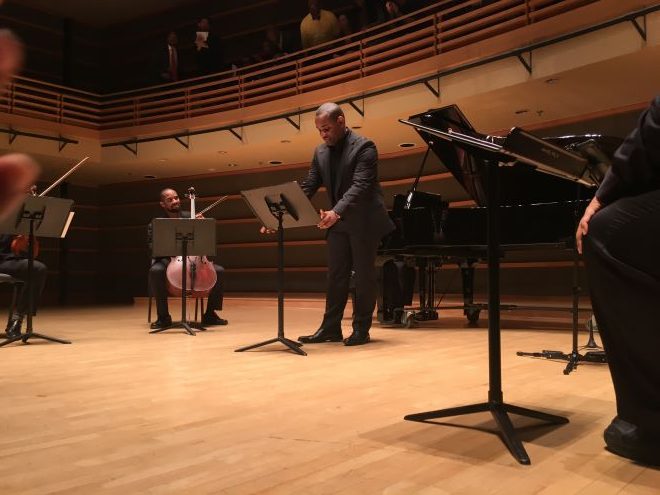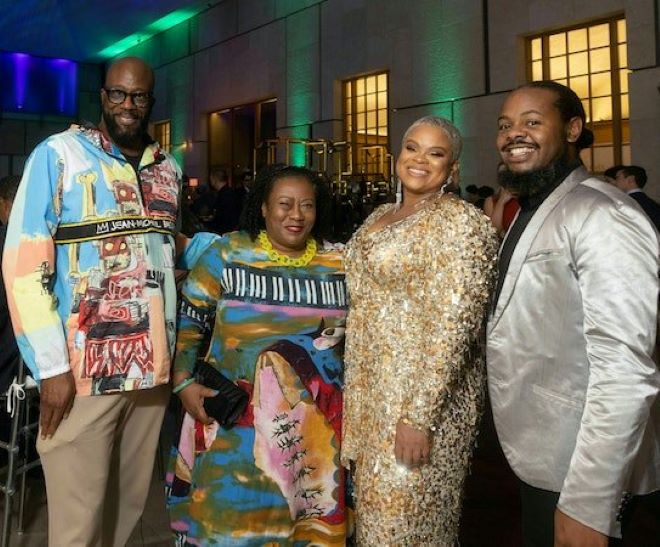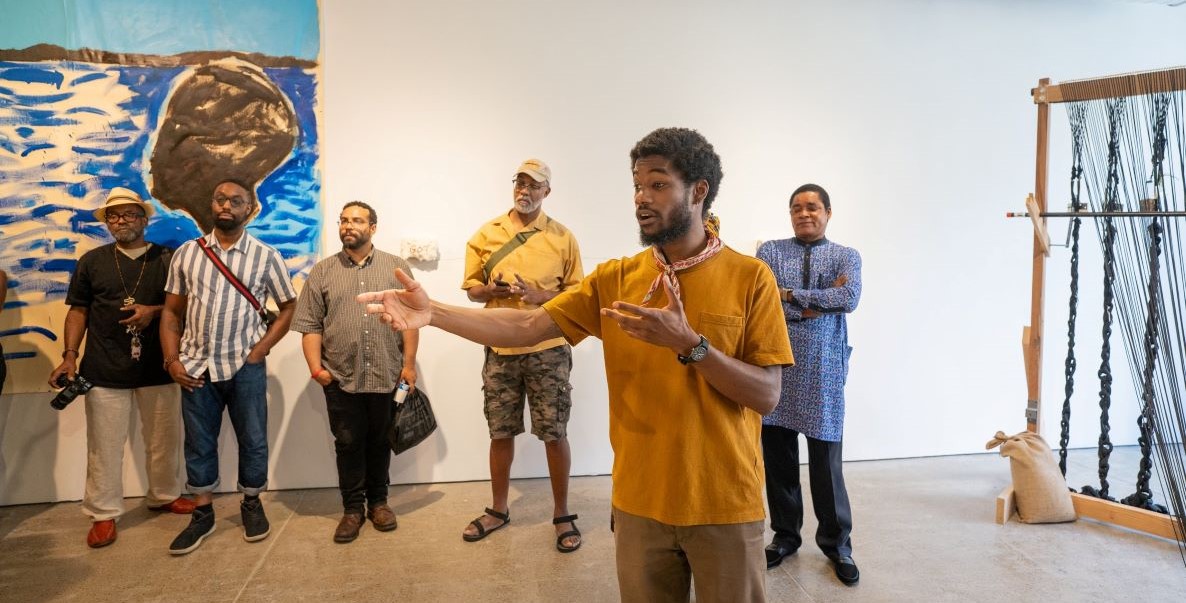Arts and culture matter. Sometimes they matter more than politics, more than policy. The history and heritage of the Black presence in the arts are too often overshadowed by an ongoing struggle for freedom and equality in a world that continues to amplify the “blacklash” that accompanies each increment of progress on the racial equity front.
Gregory Walker’s The Brothers’ Network “is rooted in affirmation and amplifying the historical and cultural importance of the role of Black men in our society through arts and culture.” The Network is a Black-led and operated nonprofit in Philadelphia that redresses what Walker identifies as the racial inequities rampant in the ecosystem of the fine arts, theater and curatorial spaces.
The Brothers Network hosts what it refers to as “Harlem Renaissance-style salons” in coffee shops, museums, libraries and theaters; Walker uses cultural experiences — readings, exhibits, plays — to engage Black men.
“It [the Brothers Network] is about deconstructing long standing stereotypes,” Walker tells me. “We’re not selling anything. And we don’t need you to like our product. We need you to think about yourself and feel good and feel affirmed.”
An early appreciation for the art of Black men
Walker was doing brotherly things well before he co-founded the Brothers Network in the city of Brotherly Love in 2007. He grew up in Bloomfield, CT where his love for the arts was seeded very early on. His parents were regular theatergoers, and he remembers the first time a playbill caught his eye (and captured his mind).
“I was just fascinated with that playbill,” he tells me. “Those were two words I had not seen put together in that way. I was like, what’s a playbill? What is that?” The play was The Great White Hope starring James Earl Jones. It debuted in 1968 at Alvin Theater.
“We’re not uplifting Black men. We’re already up. We just tell everybody what we’ve been doing.” — Gregory Walker
Another inflection point in Walker’s formative path to being an activist for the arts was when he first encountered painter Henry Ossawa Tanner’s The Banjo Lesson. “It immediately reminded me of my grandfather,” says Walker. “The Banjo Lesson just stayed with me.”
At the time, Walker knew little about the life of Tanner, who was reared in Philadelphia and attended the Pennsylvania Academy of Fine Arts in the late 19th century. Tanner ultimately left Philadelphia for Europe. He faced the racial discrimination that was commonplace in the 1890s but is widely considered to be the first African American celebrity artist. The Banjo Lesson and The Great White Hope are each critical entries in the ledger of Black art history.

Arts as a way to reach Black men
Walker’s interface with the arts planted seeds that would only blossom later in his professional life through his work in The Brothers Network. Walker’s father was a restaurateur, and at the time of his retirement in 2000, Walker was offered an opportunity to take over the family business. He declined, deciding instead to move into the healthcare space.
Walker moved to New York City and ran the TB control program and the HIV clinic at Bellevue Hospital. These roles turned into an opportunity for him to migrate to San Francisco to lead the National Task Force on AIDS Prevention.
And here is where the arts became central to Walker’s professional work. Walker led a prevention and education program that focused on Black men, who were disproportionately impacted by HIV and AIDS. “I had to find ingenious ways to get people into the room, into the spaces for education,” he says. “One of the ways I chose to do that was through art.” And it worked. Through art making and arts education, Walker was able to create a safe space for Black men to learn about their health, HIV education, and the stigmas associated with HIV/AIDS.
Walker recalls one day when “a young Black man with hair like Basquiat sauntered into the office.” The young art student shared some of his sketches with Walker who hired him as an instructor immediately. That young man was Kehinde Wiley — best known now for his portrait of President Obama. And the name of the organization behind the taskforce on AIDS prevention was The Brothers Network.
“What James Baldwin reflects most for me is the possibility of possibilities.” — Gregory Walker
“The original name is not mine,” says Walker. “It was created by a Black man who lives in Amsterdam. I called him and I said, I love this name. May I use it for this other project that I’m working on that has nothing to do with health or public health?” Walker made his way back east to settle in Philadelphia and launched this iteration of The Brothers Network in the City of Brotherly Love.
To date, the Network has curated over 300 public programs with over 40,000 attendees overall — including, recently, a Chamber Music Society concert at the American Philosophical Society; a guided tour of artist Henry Taylor’s 2023 exhibit Nothing Change, Nothing Strange at The Fabric Workshop and Museum; and a reading at the Free Library by Black birder Christian Cooper — and produced five plays. The programs involve talkbacks, led by subject matter experts, who also happen to be Black men.
On Friday, The Brothers’ Network will host author and political commentator Keith Boykin, at Theatre Exile. (At the event, I will interview Boykin about his new book, Why Does Everything Have to Be About Race.)
But according to Walker, the newsletter is the most “important nugget” in the Network. With over 5,000 subscribers Walker can cultivate community, share information, and provide powerful insights on the interface between Black men and the arts across the network. The Newsletter goes out twice weekly. And it is loaded with historical information about Black men, and relevant data to/for their lived experiences. It also provides readers with information and discounted access to world-class arts and cultural performances, written and/or produced by Black men.

Celebrating James Baldwin at 100
The network is ramping for 2024 programming in celebration of the centennial of author James Baldwin’s birthday. The life and legacy of Baldwin have directly impacted Walker and the mission of the Brothers’ Network. “I saw James Baldwin just before he died in New Haven,” says Walker. [He was] “giving a talk at Yale University, and I didn’t really know who he was at that time in 1986.” He has since read much of Baldwin’s work and still marvels at what he represents for all Black men: “What James Baldwin reflects most for me is the possibility of possibilities.”
“His trajectory in his life as a writer, as a playwright, as a thinker, as an essayist, as a novelist is all phenomenal unto itself,” Walker says. “But the way he evolved over the course of his life, for me, I don’t know anyone else who is a literary giant like he was. Who’s had that kind of evolution at a time when Black people and/or gay people (or both) were not taken seriously?”
Walker takes this work seriously. The Brothers’ Network is (for him) a platform from which he honors the production of Black art and generates Black knowledge. “We’re not uplifting Black men,” he says. “We’re already up. We just tell everybody what we’ve been doing. Everyone else is pushing Black men down, and we’re saying, look, no, we’re up here.”
![]() MORE FROM JAMES PETERSON
MORE FROM JAMES PETERSON



